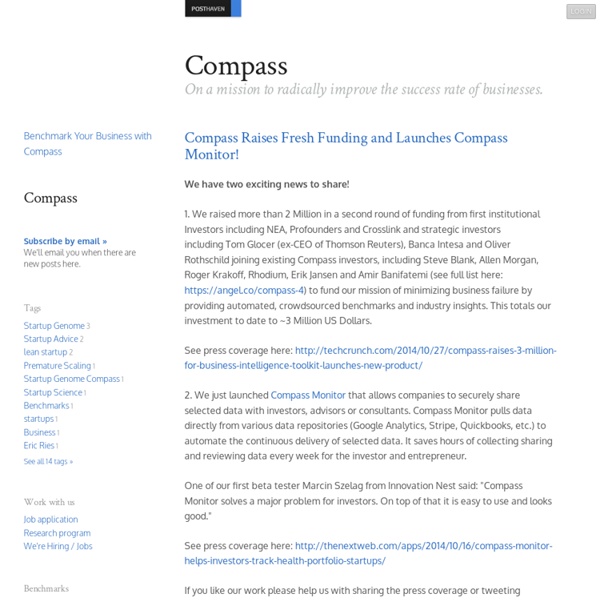



A Deeper Look At Blackbox’s Data On Startup Failure And Its Top Cause: Premature Scaling [Infographic] Earlier this week, we covered Blackbox, the young company responsible for creating The Startup Genome Report, an ongoing, collaborative R&D project designed to take a comprehensive dive into what makes Silicon Valley startups successful — and not. (Read our initial coverage here.) On Tuesday, we covered the company’s launch of what it calls the Startup Genome Compass, a benchmarking tool for startups that helps founders monitor their progress in different growth categories. Since then, more than 6,000 startups have signed up to use the Compass. Along with the diagnostic tool, Blackbox also released a new research report on the major causes of startup failure, including perhaps more significantly, the primary cause of startups kicking the bucket: Premature scaling. What’s more, “premature scaling” may seem an overly simplistic term, and it may be easy to misconstrue. For now, we’ll leave it at that. And without further ado, Visual.ly’s infographic on premature scaling is below:
STVP : Teaching : Resources Browse our collection of entrepreneurship education resources to find information regarding lesson ideas, building your own entrepreneurship center, and professional networking within the entrepreneurship education community. Lesson Planning TextbooksSuggested texts for teaching entrepreneurship Launching New Ventures: An Entrepreneurial Approach Allen, Kathleen R. [Code 764] Entrepreneurship: Successfully Launching New Ventures Barringer, Bruce R.; Ireland, R. Duane [Code 1435] Technology Ventures: From Idea to Enterprise Byers, Thomas H.; Dorf, Richard C.; Nelson, Andrew J. Building a Center Accel REE Conference Archives A listing of past international Roundtables on Entrepreneurship Education (REE). Networking
Home :: GEM Global Entrepreneurship Monitor :: Simple Story Videos - Complex solutions made simple How To Build a Web Startup – Lean LaunchPad Edition If you’re an experienced coder and user interface designer you think nothing is easier than diving into Ruby on Rails, Node.js and Balsamiq and throwing together a web site. (Heck, in Silicon Valley even the waiters can do it.) But for the rest of us mortals whose eyes glaze over at the buzzwords, the questions are, “How do I get my great idea on the web? What are the steps in building a web site?” And the most important question is, “How do I use the business model canvas and Customer Development to test whether this is a real business?” My first attempt at helping students answer these questions was by putting together the Startup Tools Page - a compilation of available web development tools. So today, I offer my next attempt. How To Build a Web Startup – The Lean LaunchPad Edition Here’s the step-by-step process we suggest our students use in our Lean LaunchPad classes. (Use the Startup Tools Page as the resource for tool choices) Step 1: Set Up Team Logistics Step 2. For non-coders:
Wavii How to name your startup Choosing a name is one of the parts of a startup I find the most difficult. It’s also something you can easily get hung up on. We all know that the key thing is to move on to actually building something we can put in front of users. Here are 3 steps I would take if I was naming a new startup: 1. Often constraints are good when undertaking a creative process like naming your startup. GoogleTwitterFacebookFoursquareDropBoxPocketTumblrFlickrHipChatSparrowTweetbotReeder All great startups. SquarePathBox 2. I used to try to be very clever about naming my startup. Unfortunately, I’m not the most creative person. Therefore, since I don’t have that creativity, I take a slightly different approach. I also like the “real word” approach for a couple of other reasons: You’re more likely to end up with a name that can be “spoken” without confusion. 3. I see many, many founders limiting themselves with the domain name. My current startup is named Buffer, but the domain name is bufferapp.com.
www Positive Projections Website Remodeling, Web Design & Marketing TheFunded.com: The Resource for Entrepreneurs. Strategyzer: Your Business Model Toolbox